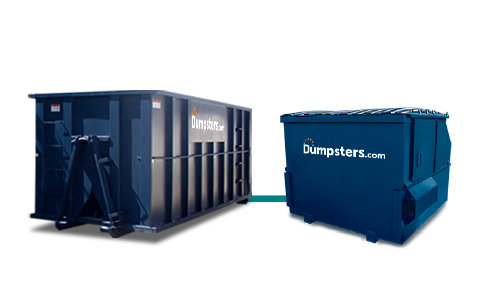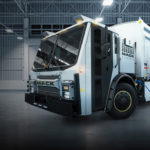Roll-offs or commercial dumpsters; Which is the one that you need?
Whenever you need a service, you always want to make sure what you ordered is what you’re going to get.
With waste collection services, It’s good to know the size, weight, price, and much more for the dumpster you are looking for.
Our garbage can range in very different sizes and shapes that sometimes makes it harder to know what type of dumpster we need to do the job.
So which dumpster is best for you? Is it a large roll-off that can take everything in your house or a smaller dumpster bin that’s more cost effective?
Let’s find out, shall we?
The Best Size.
Dumpsters are available in several sizes and styles.
You can rent a roll-off dumpster in 10 to 40 cubic yards, which are the most common sizes offered by a dumpster rental.
If you consider the size, a roll-off can hold more than your regular dumpster.
However, they take up a lot of space. So it’s good to make sure there’s plenty of space to fit a roll-off without causing blocked roads or stopping traffic.
10 – 20 yd roll-offs are best used for small renovations, junk removal, or landscaping projects.
Meanwhile, 30 – 40 yd ones are best used for larger construction projects and are more likely used by construction companies.
If a roll-off is too big for your liking, then perhaps a commercial dumpster is more up your alley.
These dumpsters are smaller, so they are great for smaller cleanup projects.
They can range anywhere from 2 yds to 8 yds and are meant more for weekly pickups rather than all in one day or for construction projects.
This smaller dumpster is best used for smaller projects as well and can only take on so many materials that will fit in the container.
So it’s always best to consider the size of the dumpster first to know if what you’re throwing away can make it into the dumpster.
The Weight Amount.
Between a roll-off dumpster vs. commercial dumpster, there is a big difference in their weight limits.
With roll-offs, the limit depends on the size you pick. A 10-yard dumpster can fit up to 10 cubic yards of debris with a maximum weight of 2,000 pounds or one ton.
20 – 40 yd dumpsters will generally take more than that, about 10 tons or 20,000 pounds (although other companies can have different posted limits).
With that said, commercial dumpsters have similar limits just like roll-offs.
https://www.dumpsters.com/sizes/dumpster-sizes
A 2-yard dumpster has a 400 pound weight limit and for every two yards in length, the dumpster adds an additional 400 pounds in weight limit.
The weight of the dumpster you order or rent should be enough to take all of the things that you would want to throw away.
If this isn’t the case however, companies can charge a “Overweight Fee” for garbage that exceeds the weight limits above.
Also, companies can do different weight limits depending on how much they want to take for their customers.
It all seems like a lot, but as long as you know how much you’re throwing away, this should be an easy process.
What’s The Cost?
Between these two services, The cost does vary depending on which one you pick and what company you’re working with.
It also depends on many factors like location, delivery, fuel, the weight of the trash, hidden fees, and much more.
However, many companies will charge around $178 per month, but it mostly depends on the factors above to know the exact pricing.
https://www.dumpsters.com/pricing/commercial-dumpster-prices
This is a great guideline to know how much you’ll be investing when needing a commercial dumpster.
Roll-offs however, you pay a full price to rent the dumpster for a little while to take away huge loads of garbage at once.
The average cost of a dumpster rental nationwide is $485 with typical prices ranging between $244 to $928.
Keep in mind that exact rates vary based on several factors, including location, dumpster size and debris type.
https://www.dumpsters.com/pricing/roll-off-dumpster-prices
What’s Allowed In The Dumpster?
Companies will usually highlight what’s allowed in their dumpsters but the common items to avoid putting in dumpsters are:
- Gas Tanks
- Tires
- Batteries
- Motor Oils
- Paint
- Refrigerators
- Rocks & Dirt
- Concrete
- Air Conditioners
- Electronics
All of these items are usually not allowed by waste companies.
This is because they can cause problems for the environment and also damage their dumpsters or equipment.
But, there is also a difference of what you can throw away between a commercial dumpster and a roll-off.
With a commercial dumpster, there are certain restrictions as to what you can put in the smaller dumpster, such as limited:
- Construction materials
- Yard waste
- Furniture
However, this can be great if you’re not throwing out that much trash.
As said earlier, this can be a much cheaper option if you’re just looking to clean out the house or a better long-term option when you’re running a business.
Roll-offs can take much more of the garbage that’s needed to be thrown away.
However, roll-offs are usually a one time rental to take out all of the huge debris away from the property.
Whether it’s for construction projects or really large clean outs, roll-offs are a great choice.
So the best choice can ultimately come down to are you going to need a dumpster often for a long period of time, or one to take everything at once?
Time And Date.
Another major difference between the two is when you’re using the dumpsters for your project or business.
With commercial dumpsters, you get to rent the dumpster for as long as you want, as long as you’re paying the usual monthly fee.
And these dumpsters are usually used for commercial businesses and small businesses that need the trash taken out every week for them.
Roll-offs though are different with when you rent them and how you use them.
Although the waste company decides how long rental periods are, many companies will give you between 3 – 5 days to use the roll-off given to you.
Although a lot of companies are pretty flexible for how long you can have the dumpster.
Many companies will also allow you to extend the rental period, but it can come at the cost of paying every day that you continue using it.
So it’s a good idea to know how much you’re throwing away and how long it will take before you tell the company that you can do it within a day or two.
To Conclude.
Which one is for you, roll-offs or commercial dumpsters?
Well, it ultimately depends more on do you need a quick, big service for a short amount of time, or a long-term smaller service that’s more cost effective?
Usually it’s commercial businesses or small business owners that need a commercial dumpster for their business.
Meanwhile, roll-offs are needed for big home projects or construction projects in general.
So when you’re needing someone to take out the trash for you or your business, think about these factors to make the best decision for yourself.
Credit: https://www.dumpsters.com/




I think you are right about checking the weight limits of your unit. I want to rent out a dumpster. We are remodeling our house.
Thanks for the reminder that roll-off dumpster are more apt to use for commercial projects. I want to look for a good commercial dumpster for rent soon because I’m planning to have a fast food establishment built in the future. Before that could happen, a demolition project should be done first.